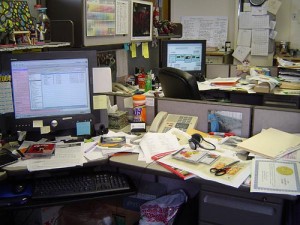
Many people will tell you that it’s great to have systems, but if creating systems takes you away from actually doing the tasks needed to grow your business, then are they really helpful?
I know people that operate better in chaos. Personally, I do better work when organized – but since many others are more successful than I, am I doing it wrong? Let’s explore both the pros and cons of being organized to find a more definitive answer.
You’re Less Likely to Drop the Ball (Pro)
If everything has its place and has been filed after you’ve completed it, then you’re probably less likely to drop any important balls. Your system (whatever that might be) should ensure that you cross your t’s and dot your i’s.
If instead you’re used to having stacks of papers and files strewn about, you might not remember to do [insert task here]. How many movies have you seen where an important task gets left undone due to misfiling or because it’s buried in a stack of paperwork? It’s a fairly common story line for a reason!
Many people have gone paperless by now, so they don’t have paper files any longer. However, you can still be disorganized and paperless in my book. If you’re not used to having an online file system (or one for your email inbox for example), it’s easy to lose focus and leave important tasks undone or emails unreplied to.
All Systems and No Action (Con)
In reference to the introduction, in my experience it is possible to be too organized. If you spend all of your time developing systems and no time marketing, networking, doing client work, etc., you have may have a problem.
Having systems and being organized is great, but if you’re not profitable you might need to reevaluate your priority list. If you’re spending your time making sure things are in order, rather than conducting business, I’m sorry to say that your business probably isn’t likely to last long.
Finding a Happy Medium
Like anything in life, it behooves you to try and find that happy medium; to strike a balance between the two extremes of disorganized hot mess and organizational Nazi. The easiest way to start is to look at your desk (or your inbox) to clarify which camp you fall into – as if you already don’t know!
If you’re all systems but struggling to grow your business, it may be time to tone it down. You may need to let some things slide in order to do the things necessary to get new business in the door. You could be the most organized businessperson on the planet, but if it’s getting in the way of you making money to pay your mortgage, it doesn’t really matter, does it?
3 Steps to Get More Organized
If on the other hand your desk looks like the one in the photo at the top of this post, it might make sense to get a tad more organized. This is true for both on and offline. Here are three easy steps to become more organized than you are right now:
1. Apply an Inbox Zero Policy
Inbox zero means to clean out your inbox each day. That means you’ve either dealt with, made a plan to deal with or archived/erased all of your new messages. Doing so creates a clean mental slate and frees up brainpower to tackle other tasks or end your workday feeling productive.
If you have a huge backlog of messages in your inbox (that still need your attention somehow), I suggest applying this mindset towards any new emails and tackling a chunk of the old (oldest first) at a time. Take the total you need to get through and divide it by the number of work days you’d like to accomplish this by. Or accomplish one past date at a time. Both can work well.
Try to implement the “one click rule” and either reply, archive or discard each email. This will help you to be more efficient, as you will only (in theory) touch each email once. Remember, progress, not perfection is the goal!
2. Establish a Tickler File System
This can be done online and offline. When I worked in my office, I would have a physical manilla folder with each day of the week listed on it. That way I could file tasks when I needed (or wanted) to complete them. I also had files for “next week” and “next month.” Some things can’t be done right away, but you need to remember to do them. This worked well for me.
You could set this up via individual email folders, Google Drive or another online program (Evernote , perhaps?). Alternatively, use a tool like Wunderlist, which offers both a filing system (determined by you) and the ability to give each task a due date. You automatically can see tasks filtered by file type (administration, personal, finances, etc) or by day, week or month.
3. Clear Your Physical Desk Each Day
If you work in an office or out of your home and have a desk, this is a great way to wrap up every workday. Physical clutter can equal mental stress. If you leave your desk a mess everyday, you might have a harder time going from work mode to a state of relaxation on the home front.
Personally I’ll lay out any physical tasks that I have (plus I have file folders that I leave open on my computer of tasks that I need to follow-up on) to get done that day. If any are left (and let’s be honest, there almost always are!), then I’ll reevaluate their priority level with my schedule for the rest of the week.
If the rest of my week is rather busy, I might put off non-urgent tasks to the next week (in my “next week folder”). If instead my week is light, then I’ll just shift what’s left to the next day or two.
A lot of people I know will write a physical to do list at the end of each of their days. This allows you to start the next workday focused and in tune with what needs to be done, rather than scrambling that morning determining what needs to be done that day.
If you’re like me, you’re most focused and motivated in the morning/at the beginning of your workday. If you delay opening up your inbox (a proven strategy of other successful entrepreneurs) right away and focus instead on your top few tasks, you’re more likely to get them done and feel productive right out of the gate.
In Conclusion
I still think it makes sense to try and stay organized. It is a personal choice based on how you work best. If you tend to fall towards the unorganized side and find that you’re leaving important tasks undone (due to misplacing paperwork, etc) or not getting back to people when you said you would, maybe it’s time for a change?
If this is you, consider carving out a bit of time each day to get more organized. Shoot for getting your email under control at first and then getting to inbox zero everyday. Next develop a filing system (online, offline or both) that works for you. Use technology to your advantage and ask your more organized friends what tool they use or try some of the ones listed above.
Lastly, try and clean up your desk at the end of each work day. Bonus points if you make yourself a to do list for the next day. The goal is to start with one small change and make it a habit, before trying to add something else. Just like making small changes to your diet tends to create more lasting change, I believe applying the same thought process to your workflow will help you end up with a more organized and more profitable business.
Now give it up: does your desk look like the picture above?
Photo Credit: bunchofpants

